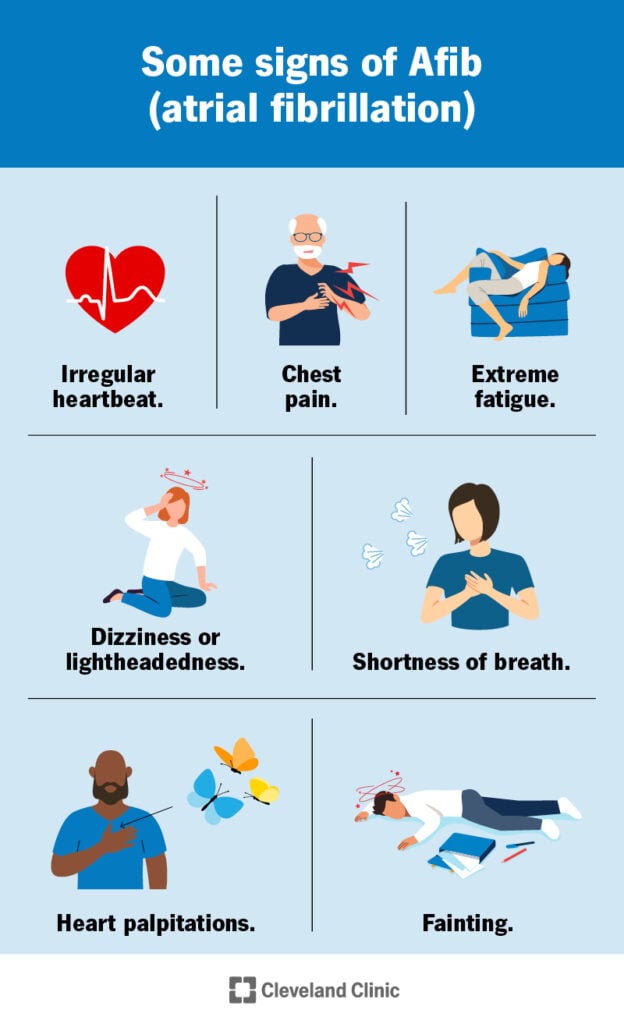Note: This blog is for informational purposes only, always check with your doctor or healthcare provider about any medical issues or symptoms you are experiencing. Call 911 if you are in distress or having symptoms that could be serious.
According to the Cleveland Clinic, Afib (atrial fibrillation) is an irregular heart rhythm (arrhythmia) that begins in the upper chambers (atria) of your heart. With Afib, your heart’s electrical system doesn’t work as it should. Instead of a steady, regular pattern of electrical impulses firing, many different impulses fire rapidly at the same time.
The older you are the more common Afib becomes according to the Mayo Clinic because with aging your risk for other conditions like high blood pressure, coronary artery disease, obstructive sleep apnea and other heart issues increases. This is why having a healthy lifestyle is important including limiting alcohol, keeping a healthy weight and eating foods that are low in salt, saturated fat and trans fat.
Guaranteed Acceptance Life Insurance
Coverage options starting at $9.95 a month!
Guaranteed acceptance life insurance without medical exams, health questions, or rate increases.
You may be interested in reading our blog, 8 Surprising Food and Drinks That Have High Salt and
7 Nutritious Foods That Won’t Break the Bank
Symptoms of Afib
Symptoms can range from lightheadedness or feeling faint to a racing heartbeat to breathlessness. Below is a graphic that shows some of the symptoms you may experience. But note, there’s a chance you have Afib with no symptoms which is why regular checkups and testing is important as you age.

The Cleveland Clinic estimates that 1 in 3 people with Afib don’t know they have it. That’s why it’s important to know the risk factors and talk with your healthcare provider. If you’re at risk, you should have your heart and pulse checked regularly so you can catch problems early.
Types of Afib
The Cleveland Clinic says that doctors classify atrial fibrillation based on how long the Afib episodes last. There are four main types listed below:
- Paroxysmal Afib episodes last less than one week and usually go away on their own without treatment. People can still feel unwell during these short periods of Afib, and people with paroxysmal Afib still have a higher risk of stroke than those without Afib at all. Paroxysmal Afib can progress to persistent Afib depending on your risk factors.
- Persistent Afib episodes last more than one week and generally need specialized treatment to either slow the heart rate down or break the Afib back to normal sinus rhythm.
- Long-term persistent Afib lasts more than a year and can be difficult to treat.
- Permanent Afib describes long-term Afib that hasn’t been responsive to attempts at breaking and staying out of Afib.
Treatment for Afib
There are several treatment options. Talk with your doctor about what’s right for you and your situation.
Medications: from blood thinners, to heart rate medications and beta-blockers, there are number of medication options based on your specific form of Afib.
Afib Procedures: If medications aren’t right for you or your specific form of Afib there are several Afib procedures including two common methods:
- Electrical cardioversion where your doctor gives your heart a shock to regulate your heartbeat.
- Catheter ablation also called radiofrequency or pulmonary vein ablation where a flexible tube typically is inserted through the groin area and into your heart to destroy the areas that are causing the Afib.
If you have concerns about your health, or are having symptoms, reach out to your doctor or health care provider for guidance.
Want more? Check out our blog 30 Days of Heart Health Activities to Help You Thrive!
Colonial Penn is here for you!
Colonial Penn has specialized in making life insurance simple and accessible by offering it directly to consumers since 1957. Click here to learn more.





